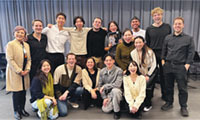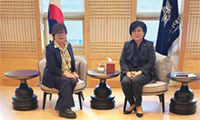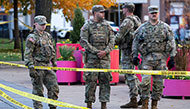Indiana University Political Science Department
In the last week of August of 1968, I landed at Bloomington. When I was registering for my first Fall semester, I had the chance to meet William J. Siffin, the faculty member who attracted me to IU due to his scholarship and leadership position in the Comparative Administration Group in the 1960s. His main concern was on “developing” developing nations. Alfred Diamant was another faculty member of IU political science department in the Comparative Administration Group. I was so happy to take Siffin’s seminar in the first semester. Professor Siffin made such an impression on me that I named my first son after him.
The Department of Government was blended into the Political Science Department when I arrived at Bloomington. For the first time, I learned about science of political science at Bloomington, which included basic statistics and computer courses. Political science 1 was a normative or traditional political science course oriented to political philosophy and Political Science 2 was a new behavioral or analytical political course for basic required political science courses. Alfred Diamant was my Political Science 1 teacher and Leroy Rieselbach was my Political Science 2 teacher. Professor Rieselbach was a distinguished scholar of Congressional Roll Call voting analysis. Young faculty John Gillespie was my computer teacher. I spent virtually everyday of one semester at the IU computer center with punching cards for computer-assisted data analysis. I was disappointed when the heavy volume of computer print-outs was not there for me. Often, there was one page print out. That meant something wrong in my punched cards dictating to produce coefficient correlations among multiple variables in my proposed research project. So under the circumstances, I had to investigate all the cards punched in order to find the reason. I was fortunate to have passed the basic required courses, but did so with some difficulty, as I was not well skilled in statistics and computers.
I was fortunate to meet Lynton Keith Caldwell who taught environmental policy and administration. We discussed the National Environmental Policy Act of 1970 in our seminar before it was legislated by the US Congress and signed by President Richard M. Nixon on the morning of January 1, 1970. For the first time, I learned of the relationship of man vs. nature, the eco-system and one Earth. As a nature-loving poet, I enjoyed the courses he taught. He was the founding father of environmental policy and administration in the academic field of public policy and administration. He was kind to guide me through a field of which I knew very little prior to my time at IU.
During my life at Bloomington, 1968-1972, I was elected as a foreign student representative to the IU Student Government, a body that was preoccupied with managing the relationship between the Town people and the Greek House students. Michael King was Vice President of the Student Government who represented the Town people. He was the publisher and editor of the underground students’ weekly. I contributed my poems and essays to his weekly newspaper. We shared a belief against the Vietnam War. He was sympathetic to my political writings against the South Korean government. In the fall of 1970, the Student Government sponsored my poetry-art ensemble at the Union Building for one month. AP and UPI produced articles on my poetry-art show. My political science teachers came to see the show aand encouraged me to continue my poetry as a political scientist.
In the 1972-73 academic year, I started my first teaching job at University of Wisconsin-Whitewater to replace a faculty member who was on leave. In the interview process, I was asked whether I was sufficiently knowledgeable to teach an American Government course. The Vice President of University of Wisconsin-Whitewater questioned my ability, but two students representing the student body and the faculty members supported me well. This was my first teaching position in the United States. In the early 1970s, I could not return to my home country due to my political activities against the authoritarian Korean government ruled by former army general Park Chung-hee.
In late 1970s, I spent several years teaching at Old Dominion University in Virginia, but was eventually turned down for a tenure evaluation. I was suddenly confronted to high wall of tenure evaluation arbitrarily imposed by senior faculties who did not publish a single scholarly article. First of all, I had the highest student evaluations of my teaching performances, even though my colleagues pointed out my Korean accent. I had published several scholarly publications, constantly engaged in the grantmanship and professional services with the American Society of Public Administration, and contributed as an Op-Ed writer for local Tidewater Virginia newspapers.
I then left for Jackson State University and taught at Jackson, Mississippi for a couple of years. I moved to Washington as a National Association of Schools of Public Affairs and Administration fellow. It was here, when I was just 40, where I experienced first-hand, the real world of bureaucracy at the Pentagon as an assistant for environmental quality in the Office of the Secretary of Defense, 1980-82. My major work was my essay, “Balancing Environment and the Nation’s Defense,” the first article on Defense and the Environment I published in Defense Magazine in 1983. I published my articles in the Washington Post and acquainted with the Post writers and staff.
Then, I was offered a teaching position at the University of the District of Columbia School of Public and Business Administration. I taught the master’s degree of program of public and business administration. During my life in Washington, I read my poems at the Library of Congress under the sponsorship of Poet Laureate Rita Dove in April 1994 and later in 2003, commemorating the centennial year of the Korean immigration to Hawaii sugar plantation. I had the honor of being the first Korean-American to do such a reading at the Library of Congress.
In 1996, I returned to Korea to take a position at the University of Seoul, motivated by personal reasons. My mother was ill from her old age. But I also had a desire to be able to teach Korean students in my homeland. My contributions to South Korea’s environmental policy and management and safety policy and disaster management must be remembered with my personal life with my mother who sacrificed her life for my education in the US. My research ranged from finding low-level radioactive waste disposal sites, a challenge in Korea due to its reliance on nuclear energy on a relatively small landmass, to establishing water resource management policy since Korea is a water-scarce nation with a long dry season and short flooding months.
After my mother passed away, I completed my teaching career in 2006. I was 65. I returned to my Virginia home. In 2010, I produced my memoir, Song of Myself: a Korean-American Life (Poetic Matrix). I am still active as a poet and writer, enjoying my life in the Virginia woods. I am a decent husband of my wife and humble father of my two children working in New York City.
I am grateful to the IU political science department who offered me the foundation of my American life. I miss my teachers very much.
--This is Dr. Choi’s speech at Indiana University, 2017. It may be his farewell speech to Indiana University, because he does not know when he makes another trip to Bloomington.
<By Dr. Yearn Hong Choi>
스마터리빙
more [ 건강]
[ 건강]이제 혈관 건강도 챙기자!
[현대해운]우리 눈에 보이지 않기 때문에 혈관 건강을 챙기는 것은 결코 쉽지 않은데요. 여러분은 혈관 건강을 유지하기 위해 어떤 노력을 하시나요?
 [ 건강]
[ 건강]내 몸이 건강해지는 과일궁합
 [ 라이프]
[ 라이프]벌레야 물럿거라! 천연 해충제 만들기
 [ 건강]
[ 건강]혈압 낮추는데 좋은 식품
[현대해운]혈관 건강은 주로 노화가 진행되면서 지켜야 할 문제라고 인식되어 왔습니다. 최근 생활 패턴과 식생활의 변화로 혈관의 노화 진행이 빨라지고
사람·사람들
more
창작 뮤지컬 ‘도산’ 웍샵
창작 뮤지컬 ‘도산’이 뉴욕 맨해튼에서 미국배우조합 리딩 웍샵을 성공적으로 마쳤다. LA 무대예술인그룹 시선(대표 클라라 신)이 제작한 이 작…

“한국어 교육 확산 협력”
한국어진흥재단(이사장 모니카 류)이 숙명여대(총장 문시연)와 한국어 교육 확산을 위한 협력에 나선다. 한국어진흥재단의 모니카 류 이사장은 지난…
송년행사 시즌 ‘돌입’ 12월 첫 주부터 본격
추수감사절 연휴를 기점으로 남가주 한인사회가 본격적인 송년행사 시즌에 돌입한다. 한 해를 마무리하고 새해를 준비하기 위한 각 단체·동문회의 연…
KYCC·VWKC·주민의회 등 합동 타운 대청소 …
한인타운청소년회관(KYCC)과 헤더 허트 시의원(LA 10지구) 사무실, 그리고 행사에는 윌셔 한인타운 커뮤니티 목소리(VWKC), 내셔널 유…
ROTC 남가주 동지회 골프 모임
ROTC 남가주 동지회(회장 이창훈)는 지난 22일 라미라다 골프코스에서 골프 모임을 열었다. 이날 행사에는 30여 명이 참석해 라운딩을 함께…
많이 본 기사
- 이민 구금자수 역대 최다… 단순 체류위반 20배 폭증
- 추수감사절 ‘포식’, 심장에는 위험 신호 될 수 있다
- 인간의 경쟁자 될까, 든든한 동료 될까… ‘휴머노이드의 진화’
- 한인 2세 지나 권씨 주정부 장관에
- 유동근♥전인화 CEO 딸, 방송 최초 출연.. “미모? 공들인 얼굴”
- 국민연금 증명 편리해진다 온라인 아포스티유 발급
- 트럼프 “백악관 앞 총격은 테러”… 반이민 강화 고삐
- JP모건, ‘S&P 500 목표가 8,000P’
- 연말을 향해 달리는 불빛의 궤적
- 경찰관이 근무 중 도둑질 차량 수색하며 현금 꿀꺽
- 집값 상승에 ‘투자 대이동’… 중산층 절반 이상이 ‘주식’
- 이병헌, 레오나르도 디카프리오·티모시 샬라메와 나란히..美시상식 후보
- 극단적 선택 시도 고백 후..MC몽, 이번엔 사기 피해 당부
- 이용대, ♥윤채경 열애설 질문에 당황.. “넘어가 달라”
- 홍콩 77년래 최악 화재… ‘대나무 비계’타고 불길 번졌다
- 제주에서 수출한 일본판 ‘올레’… 1300년 전 길을 걷다
- 일주일 강수량이 무려 1.8미터… 동남아 ‘물폭탄 비명’
- 트럼프 행정부, 올해 연방 공무원 32만명 감원
- LA 주민 3분의 2 “카운티 잘못된 방향 간다”
- [마크 A. 시쎈 칼럼] 트럼프 승리를 파괴하는 백인 우월주의자들
- 401K 비차별 테스트 준비
- 아마존, 사기 급증 경고 연말맞아 회사 사칭 극성
- “에어프레미아, 내년 3월 워싱턴 취항”
- BTS 정국, 솔로곡 스포티파이 누적 재생수 100억회 달성
- [주말 뭐 볼까 OTT] ‘진정한 사랑은 자본주의가 빼앗을 수 없다’… 사랑의 진짜 가치는?
- 트럼프 관세발 물가… ‘정책 유턴’ 신호탄?
- “반갑다 집값 둔화”… 5개월 연속 90만달러 밑돌아
- LA 주차위반 단속 강화… 티켓 발부… 1
- ‘도우인 메이크업(중국식 메이크업)’ 붐 타고… 동남아·일본 등 폭풍성장
- ‘이강인 교체 투입’ PSG, 토트넘 5-3 격파
- [한국춘추] 감사의 힘
- [역사 속 하루] 태즈메이니아 섬 발견, 비극의 시작
- 추수감사절 연휴 맞아 LA 오토쇼 관람 인기
- [금요단상] 장미의 이름, 진리의 이름
- “캠벨수프 소비자는 빈곤층” 발언 논란
- 개인적 상처를 판타지로 승화시킨 감독의 용기
- 2026년 은퇴플랜 불입금 상한선 변화
- 국방부, 알리바바 제재 중국군 지원 명단 포함
- 증시, 연휴 휴장·반장 오늘 오후 1시까지만
- 오바마케어 보조금 연장 이뤄져야
- 겨울철 심장 관리… 오메가3·크릴오일 질환 예방 효과 ‘글쎄’
- ‘오픈AI’ 분석 파트너사 해킹 당해
- [이런 일도] ‘인간 세탁기’ 나온다
- 리듬과 시조, 미래의 언어
- [전익환 프로의 골프교실] 백 스윙의 몸 동작
- 송성문 행선지로 다저스·샌디에고 예상
- [만화경] AI 거품론과 ‘그린스펀 오판’
- 오늘 블랙 프라이데이, 샤핑시즌 개막
- ‘5년내 유료구독자 2억2,000만명’
- UC, 등록금 인상 자제 노력 더 해야한다
1/5지식톡

-
 테슬라 자동차 시트커버 장착
0
테슬라 자동차 시트커버 장착
0테슬라 시트커버, 사놓고 아직 못 씌우셨죠?장착이 생각보다 쉽지 않습니다.20년 경력 전문가에게 맡기세요 — 깔끔하고 딱 맞게 장착해드립니다!장착비용:앞좌석: $40뒷좌석: $60앞·뒷좌석 …
-
 식당용 부탄가스
0
식당용 부탄가스
0식당용 부탄가스 홀세일 합니다 로스앤젤레스 다운타운 픽업 가능 안녕 하세요?강아지 & 고양이 모든 애완동물 / 반려동물 식품 & 모든 애완동물/반려동물 관련 제품들 전문적으로 홀세일/취급하는 회사 입니다 100% …
-
 ACSL 국제 컴퓨터 과학 대회, …
0
ACSL 국제 컴퓨터 과학 대회, …
0웹사이트 : www.eduspot.co.kr 카카오톡 상담하기 : https://pf.kakao.com/_BEQWxb블로그 : https://blog.naver.com/eduspotmain안녕하세요, 에듀스팟입니다…
-
 바디프렌드 안마의자 창고 리퍼브 세…
0
바디프렌드 안마의자 창고 리퍼브 세…
0거의 새제품급 리퍼브 안마의자 대방출 한다고 합니다!8월 23일(토)…24일(일) 단 이틀!특가 판매가Famille: $500 ~ $1,000Falcon: $1,500 ~ $2,500픽업 & 배송직접 픽업 가능LA…
-
 바디프렌드 안마의자 창고 리퍼브 세…
0
바디프렌드 안마의자 창고 리퍼브 세…
0거의 새제품급 리퍼브 안마의자 대방출 한다고 합니다!8월 23일(토)…24일(일) 단 이틀!특가 판매가Famille: $500 ~ $1,000Falcon: $1,500 ~ $2,500픽업 & 배송직접 픽업 가능LA…
케이타운 1번가
오피니언

오바마케어 보조금 연장 이뤄져야

UC, 등록금 인상 자제 노력 더 해야한다
 마크 A. 시쎈 / 워싱턴포스트 칼럼니스트
마크 A. 시쎈 / 워싱턴포스트 칼럼니스트 [마크 A. 시쎈 칼럼] 트럼프 승리를 파괴하는 백인 우월주의자들
 유경재 나성북부교회 담임목사
유경재 나성북부교회 담임목사 [한국춘추] 감사의 힘
 김인자 시인·수필가
김인자 시인·수필가 [금요단상] 장미의 이름, 진리의 이름
 최호근 / 고려대 사학과 교수
최호근 / 고려대 사학과 교수 [역사 속 하루] 태즈메이니아 섬 발견, 비극의 시작
 최형욱 / 서울경제 기자
최형욱 / 서울경제 기자 [만화경] AI 거품론과 ‘그린스펀 오판’
 조재성 LA 포럼 회장·도시비평가
조재성 LA 포럼 회장·도시비평가 [조재성 박사의 두 도시 이야기] 코리아타운, 불완전함의 아름다움
 김재천 서강대 국제대학원 교수
김재천 서강대 국제대학원 교수 [김재천 칼럼] 경제로 안보를 사는 시대
1/3지사별 뉴스

정혜선한국전통예술원 ‘아리랑-동방의 울림’공연 성황
정혜선한국전통예술원의 특별공연 ‘아리랑-동방의 울림’(Arirang-Echoes of the East)이 지난 23일 전석 매진속에 뉴저지 포…
오바마케어 보조금 2년 더 연장되나

“에어프레미아, 내년 3월 워싱턴 취항”
신생 항공사인 에어프레미아(Air Premia, 사진)가 내년 3월부터 인천과 워싱턴 덜레스 공항을 정기운항할 것으로 알려져 관심이 쏠린다.한…
마이클 박 연방 판사 ‘유력한 대법관 후보자로 급부상’

트럼프 “총격당한 주방위군 병사 2명 중 1명 사망”
도널드 트럼프 대통령은 27일 아프가니스탄 출신 이민자로부터 전날 워싱턴DC의 백악관 인근에서 총격을 당한 주방위군 병사 2명 중 1명이 사망…
피아니스트 조성진, 내년 1월 SF에 온다

오늘 하루 이 창 열지 않음 닫기 


















































.png)


댓글 안에 당신의 성숙함도 담아 주세요.
'오늘의 한마디'는 기사에 대하여 자신의 생각을 말하고 남의 생각을 들으며 서로 다양한 의견을 나누는 공간입니다. 그러나 간혹 불건전한 내용을 올리시는 분들이 계셔서 건전한 인터넷문화 정착을 위해 아래와 같은 운영원칙을 적용합니다.
자체 모니터링을 통해 아래에 해당하는 내용이 포함된 댓글이 발견되면 예고없이 삭제 조치를 하겠습니다.
불건전한 댓글을 올리거나, 이름에 비속어 및 상대방의 불쾌감을 주는 단어를 사용, 유명인 또는 특정 일반인을 사칭하는 경우 이용에 대한 차단 제재를 받을 수 있습니다. 차단될 경우, 일주일간 댓글을 달수 없게 됩니다.
명예훼손, 개인정보 유출, 욕설 등 법률에 위반되는 댓글은 관계 법령에 의거 민형사상 처벌을 받을 수 있으니 이용에 주의를 부탁드립니다.
Close
x